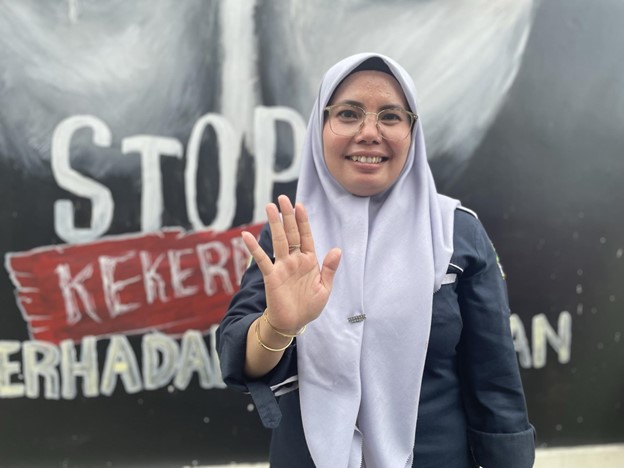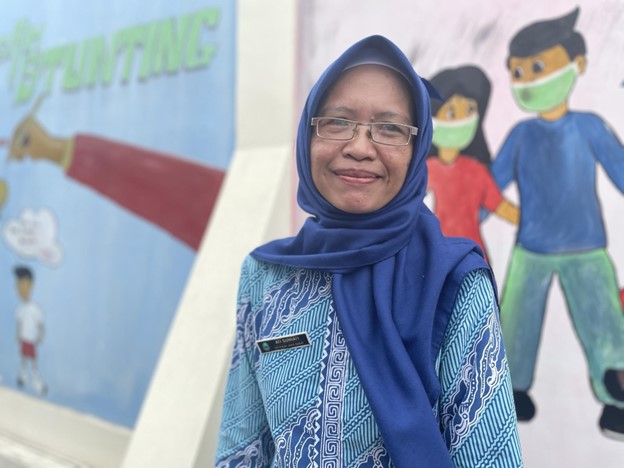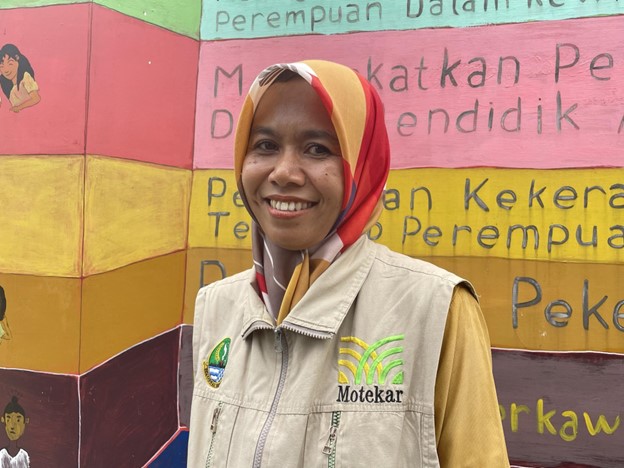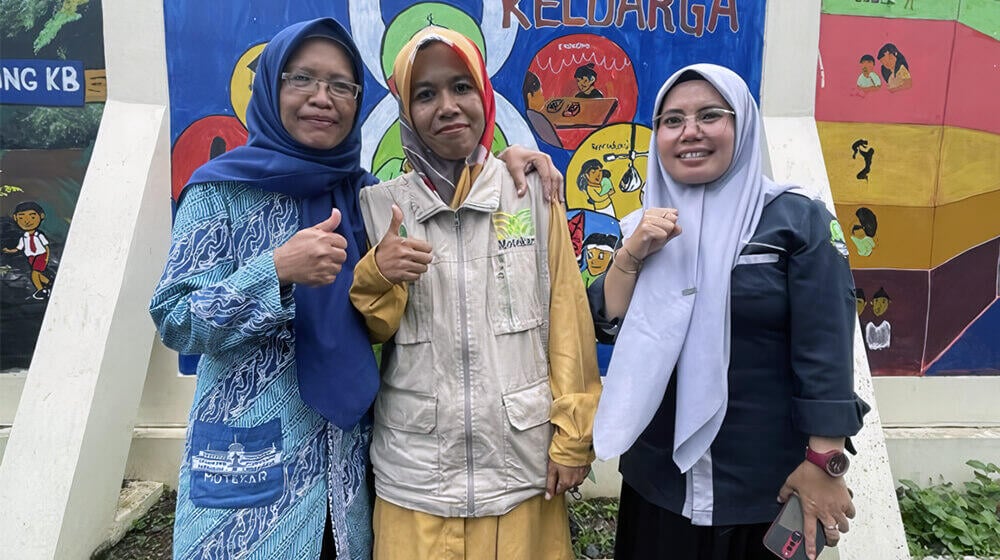Family resilience motivators (Motekar) of the Cianjur district Office of Population Management, Family Planning, Women Empowerment, and Child Protection (DPPKBP3A) are the backbone of the sex, age, disability disaggregated data (SADDD) collection for the Cianjur earthquake humanitarian response in late 2022. Despite all the challenges they have faced in visiting displacement tents in hard-to-reach areas, for Ati Sumiati (45), Ani Yunengsih (40), and Nursyaidah (46), this is an important task they proudly take on to help make sure that the needs of women and girls affected by the Cianjur earthquake are prioritized.
As part of the Pulih Bersama C-Surge Project supported by the Australian Department of Foreign Affairs and Trade (DFAT), UNFPA Indonesia collaborated with the National Disaster Management Authority (BNPB) and the Ministry of Women’s Empowerment and Child Protection (KPPPA) to train enumerators on the utilization of baseline population and online rapid disaggregated data collection tools for disaster response: ArcGIS Survey123 and its visualization through ArcGIS Dashboard Operation. These tools were used for SADDD collection in the Cianjur earthquake response.
Ati, Ani, and Nur were among the 77 enumerators conducting the SADDD collection in November 2022 in the five most affected sub-districts in Cianjur: Cugenang, Pacet, Warung Kondang, Cianjur, and Gekbrong.
“The training took only 1-2 days because we needed them to start working as soon as possible. We focused on introducing the tools, how to read questionnaires, understanding of the content and purpose of the questionnaire, and how to ask the questions so that the respondents understand,” Narwawi Pramudhiarta, UNFPA Indonesia’s Geospatial and Humanitarian Data Analyst, said.
“The use of the ArcGIS survey application helped make the data collection faster and the data more accessible… so that the government can provide assistance faster and more precisely in the most affected areas,” Ati recalled.
“From the data collection, we found that the earthquake survivors have many urgent needs… We collected data from women and girls… from all villages, the needs of women and girls are basically the same such as blankets, menstrual pads, medicines, and underwear,” Nur elaborated. SADDD also helps identify the specific needs of women and girls who face higher risks of gender-based violence in disaster settings as well as other vulnerable groups such as women with disabilities and older women who have specific needs. With this critical information, humanitarian response can provide targeted assistance that meets the needs of women and girls.
For Nur, who used to volunteer at integrated health service centers (posyandu), being involved in the Cianjur disaster response is part of her responsibility as a motekar. “I decided to work as a motekar so that I can dedicate my life to helping the community, especially women and children.” Similarly, Ani and Ati are also motivated to contribute to improving the health and protection of women and children in their communities.

(Photo: Rahmi Dian Agustino/UNFPA INDONESIA)
As the family resilience motivators, Ati, Ani, and Nur have helped make a difference in the lives of the community members.
Providing informal education to local women, Ati has contributed to changed health behaviors. “As a motekar, I help raise awareness among mothers so that they would visit integrated service centers (posyandu) to access maternal and child health services.”

Photo: Rahmi Dian Agustion/UNFPA Indonesia
Ani is also proud for improving awareness of the people in her community, which has helped reduce teenage pregnancy and child marriage. “We educated men and women about causes of child marriage that usually happen at the age of 15-19, and that the minimum age for marriage is 19,” Ani explained. “We also assist couples in navigating the legal process of documenting their marriage. “We have provided guidance for women to delay and plan their marriages and pregnancies,” Nur added.

Photo: Rahmi Dian Agustino/UNFPA Indonesia
Just as important, motekars also help with gender-based violence cases. “Motekars identify victims of violence, mediate in divorce cases, assist with the legal documents of babies,” Ati explained.
The role of motekars in protecting the rights of women and children in everyday life makes them the right personnel to conduct the SADDD collection.
“The earthquake happened on Monday. On Sunday, we already planned to conduct an educational session in Cugenang on Tuesday. After the earthquake impacted the area, we still went there, not for the educational session, but for distributing aid that we gathered from individual donations,” Nur recalled. “It was heartbreaking to see the impact of the earthquake… but thankfully the area where I live is not impacted.”
Accessing the impacted areas was not easy. “The streets are congested and slippery because of the rain. Cars cannot go there. So we have to either walk or ride a motorcycle. We separate ourselves into different teams that go to different areas. There were four people in each team,” Nur explained. “It would rain a lot, but we try to enjoy it.”
Even though Ati. Ani, and Nur are not affected by the earthquake, helping the Cianjur community is their priority. “When we met a woman, she was so excited to see us that she hugged us… She said, ‘I don’t know who else would listen to me.’ So, we do this work not only to collect data but also to provide moral support,” they said.
In the end, Ati, Ani, and Nur hope that the lives of the people can go back to normal in Cianjur. “We hope Cianjur will recover soon,” they said firmly.
Rahmi Dian Agustino
Communications Analyst, UNFPA Indonesia


